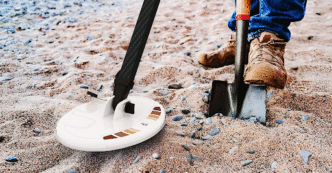The thrill of discovering something hidden beneath the earth has captivated explorers for decades. Whether it’s an ancient coin, a relic from history, or a gleaming nugget of gold, the sense of reward is unlike any other. For those passionate about the hunt, choosing the right location is everything. While the tools matter—such as a quality metal detector or a reliable gold detector—the environment plays an equally crucial role. Let’s dive into some of the best global hotspots that have become legends in the world of treasure hunting.
Why Location Matters in Metal Detecting
The success of your hunt often hinges on where you search. Certain areas are historically rich, others geologically promising, and some simply offer easy accessibility. Over time, different parts of the world have gained reputations among detectorists due to the sheer volume or value of discoveries made there. Whether you’re aiming to uncover historical artifacts or searching for precious metals, the right terrain paired with experience and the right equipment like a modern metal detector can make all the difference.
United Kingdom: A Timeless Treasure Trove
The UK is a dream destination for hobbyists and professionals alike. Its deeply layered history—ranging from the Roman Empire to Viking invasions—makes it one of the richest territories for relic hunting.
Fields across the English countryside often yield Roman coins, medieval jewelry, and even buried hoards. Unlike many countries, the UK has clear and supportive legislation in place that encourages responsible treasure hunting. Clubs and communities are active and welcoming, offering both guidance and camaraderie.
For those interested in using a gold detector, while gold isn’t as commonly found as relics, regions like Scotland and Wales have gold-bearing streams where enthusiasts try their luck.
Australia: A Gold Hunter’s Paradise
Australia has long been synonymous with gold. Its famous gold rush in the 1850s left behind a landscape full of forgotten nuggets and abandoned mining towns. Modern-day detectorists often head to Western Australia, Victoria, and Queensland where the terrain is rugged, yet brimming with possibility.
With a specialized gold detector, prospectors have uncovered multi-ounce gold nuggets just inches below the surface. The country’s vast outback and loose regulations regarding metal detecting make it an appealing spot for those who are serious about striking it rich.
It’s worth noting, however, that the Australian outback can be harsh. Adequate preparation, water supply, and sun protection are essential for safety.
United States: A Land of Layers and Legends
From Civil War relics to buried outlaw loot, the U.S. offers a wide variety of terrains and opportunities for all types of detecting. Certain states stand out for their treasure-hunting potential.
Highlights include:
- Arizona and California: Ideal for gold detector enthusiasts searching for placer gold.
- Florida: The treasure coast is known for shipwreck treasures washing ashore, especially after storms.
- Virginia and Pennsylvania: Rich in Civil War history, offering musket balls, belt buckles, and other artifacts.
- New England: Known for colonial history and early settlements.
The diversity of the U.S. means there’s something for everyone—whether you prefer beaches, battlefields, forests, or deserts. Permissions and regulations vary by state, so it’s wise to do your homework before beginning your hunt.
Spain and Portugal: Sun-Soaked Riches
The Iberian Peninsula offers a perfect mix of warm weather, welcoming landscapes, and centuries of layered civilizations. Spain and Portugal have seen Roman occupation, Moorish rule, and maritime empires. As a result, the soil holds everything from ancient coins to lost jewelry and military relics.
While the use of a metal detector in these countries may require permits in certain areas, the richness of finds makes the process worthwhile. Coastal regions are particularly fruitful after heavy rainfall or storms, when shifting sands reveal what’s long been buried.
Japan: A Unique Blend of Ancient and Modern
Japan may not be the first country that comes to mind for treasure hunting, but its long history and cultural reverence for relics make it a hidden gem for detectorists. Temples, battlefields, and rural areas occasionally yield ancient coins and samurai-related artifacts.
Though Japan has strict rules regarding archaeological discoveries, hobbyist metal detecting is not completely prohibited. Parks and beaches may offer casual detectorists the chance to discover lost valuables, especially in tourist-heavy regions.
The key here is respectful detecting and a sensitivity to cultural heritage. A powerful metal detector can help navigate the densely mineralized ground found in some areas.
Italy: Digging Through Centuries of Civilization
Italy, the heart of the Roman Empire, offers an unmatched depth of historical material. Yet, this very legacy means it’s tightly protected. That said, rural areas, agricultural lands, and privately owned fields sometimes offer access to enthusiasts—especially those with connections or granted permissions.
A patient detectorist using a versatile metal detector may come across Roman coins, military artifacts, or even Renaissance-era trinkets. Southern regions and islands like Sicily also provide diverse terrain, increasing the odds of unique discoveries.
Keep in mind that Italy takes heritage preservation seriously. Be prepared for paperwork and always follow local laws and regulations.
Where Beachcombers Thrive: The Caribbean
Tropical sun, white sands, and lost treasure—what more could a detectorist ask for? The Caribbean islands have long been linked to pirates and shipwrecks, and today, many of their beaches still hold relics of that swashbuckling past.
Top spots include:
- Barbados
- Bahamas
- Dominican Republic
- Cuba
Using a waterproof metal detector, hobbyists often uncover lost jewelry, coins, and trinkets lost by tourists. Some islands even hold shipwreck relics from colonial trading routes.
Always check with local authorities about the legality of metal detector use, as some islands require permits or prohibit detection in archaeological zones.
Places Where Bullet Points Help: Quick Picks for Travelers
If you’re planning an international treasure hunting trip and want a quick shortlist of destinations, here are some top picks categorized by the type of find you’re after:
- Gold Nuggets: Western Australia, Arizona, California
- Ancient Relics: UK, Italy, Spain
- Shipwreck Finds: Florida, Caribbean Islands, Portugal
- War Memorabilia: U.S. Civil War States, Japan
- Lost Jewelry: Beaches in the Caribbean, Mediterranean, and Southeast Asia
Essential Considerations Before You Go
Treasure hunting is exciting, but it’s also a responsibility. Regardless of where you go, it’s crucial to respect local laws and the cultural significance of your finds. Many countries have strict export rules or reporting requirements when it comes to historical artifacts. Being a responsible detectorist ensures that the hobby remains accessible and respected.
Additionally, always seek permission when exploring private land. Even in countries where detecting is widely accepted, trespassing without consent can lead to legal trouble and damages the community’s reputation.
Using a gold detector or metal detector responsibly includes filling in holes, not disturbing natural habitats, and leaving a place as you found it—if not cleaner.
The Global Hunt Beckons
Treasure hunting is more than a hobby—it’s a connection to the past, a blend of adventure and patience. Whether you’re hoping to unearth gold in the Australian bush or trace history in a Roman field, your journey begins with knowledge and respect for the land you explore.
Each terrain offers its own mystery and magic. Armed with your trusted metal detector, a sense of curiosity, and a deep appreciation for discovery, you’ll find that the world is indeed full of buried stories waiting to be told.










